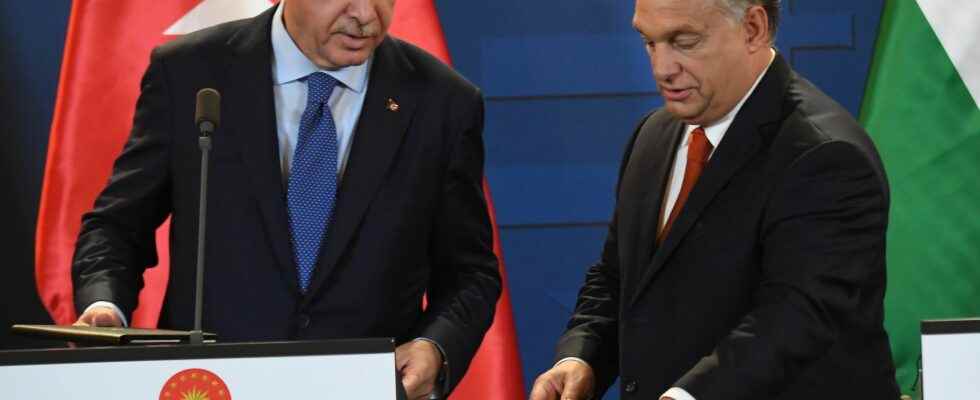All smiles, Jens Stoltenberg could hardly seem more optimistic than last July. At the time, the Secretary General of NATO boasted of the rebirth of the Atlantic Alliance in the face of the Russian threat, after years of “brain death”. Better still, Sweden and Finland, two major European military powers, put an end to decades of “neutrality” and asked to join the Alliance. “We are witnessing the fastest accession process in the history of NATO”, Stoltenberg triumphed then.
The delicate Swedish file
Seven months later, NATO is disillusioned. If twenty-eight countries of the Alliance have ratified the accession of Sweden and Finland, two others are missing: Turkey and Hungary. Turkish President Recep Tayyip Erdogan had warned from the outset that he would ask for strong concessions from the Scandinavians to let them join NATO. Negotiations with Turkey, hitherto carried out with a smile by the Swedes and the Finns, now seem to be going into a wall. The Turks canceled the visit of the President of the Swedish Parliament to Ankara, scheduled for January 17, and the very placid Prime Minister Ulf Kristersson let go at the beginning of the year, annoyed: “Turkey wants things that we cannot and do not don’t want to give them.”
If Ankara quickly reached an agreement with Finland, the Swedish file is indeed much more delicate. More than 100,000 Kurds live in exile in the kingdom, and Turkey is requesting the extradition of several hundred of them, whom it accuses of being close to the PKK terrorist group. “The membership of Finland and Sweden in NATO does not depend on us, Turkey, but on their decisions, underlines Akif Cagatay Kiliç, the chairman of the Foreign Affairs Committee of the Turkish National Assembly, to from L’Express. Turkey is a country that has to face a real existential threat with terrorism on its borders but also inside its country.” Incidentally, the AKP deputy, close to Erdogan, refutes any Turkish desire to harm NATO or help Russia by blocking the accession of Scandinavians: “We want to remind you that we did not wait until 2022 to help militarily Ukraine, which would be in a completely different situation today without Turkey’s support.”
On the Swedish side, the embarrassment has been increasing in recent months: the government has dropped ballast on arms exports to Turkey and has strengthened the cooperation of its intelligence services with Ankara. But extraditions are exclusively a matter for justice, completely independent of political power. In a poll published at the beginning of January in the Swedish press, 79% of respondents believe that Sweden must prioritize respect for the rule of law over membership of NATO… Out of the question, under these conditions, to expel from forces dozens of political refugees into Turkey.
An expectation that benefits Putin
Stockholm is therefore trying to find compromises: several asylum requests from Kurds have been refused in recent weeks, which however seems very insufficient for Turkey. “The Turkish power may feel a need to monetize its agreement, as it did in 1999 to approve the entry of Poland, Hungary and the Czech Republic into NATO, explains Amélie Zima, researcher at the Institute for Strategic Research of the Military School (IRSEM) Some of Turkey’s demands were logical, such as asking the Swedes and Finns to lift the embargo on the sale of arms to Ankara, established in 2019. It would be unlikely that within the same military alliance we refuse to sell arms.
Within NATO itself, the Turkish position is beginning to irritate and seriously worry. “As Erdogan has elections soon [NDLR : en juin prochain], we knew he was going to flex his muscles and want to show himself important on the international scene, says a diplomat. But Ankara is putting us in difficulty: getting Sweden and Finland to join means increasing the strategic dilemmas for Russia. Which would be entirely in Turkey’s interest.” Erdogan seems to have other priorities, such as not angering his economic ally Vladimir Putin and continuing to mediate between kyiv and Moscow.
Especially since Turkey is not the only Member State to block Scandinavian membership: Viktor Orban’s Hungary continues to postpone its ratification vote in Parliament. The next one is scheduled for February, after being canceled at the last moment in December. “The Hungarians claim that their parliamentary calendar is too full, which seems to be a rather fallacious argument, points out Amélie Zima. The hypothesis that worries the Swedes would be that Hungary wants to cash in on its ratification and asks that the European Union show itself more accommodating towards its breaches of the rule of law… But when all member states have taken a decision and only two countries are blocking, this turns them into black sheep within the organization and a form of common pressure can take place Above all, there is no reason to refuse membership to Sweden and Finland, since they meet all NATO criteria.”
For the Allies, it becomes clear that, regardless of Sweden’s concessions, it will be necessary to wait for the results of the Turkish elections to ratify the adhesion of the two Scandinavian countries. The Alliance summit in Vilnius, scheduled for July 11 and 12, now seems a reasonable goal, and perhaps not so distant. After all, Bosnia and Herzegovina, a NATO partner country, launched its process of joining the organization in April… 2010.
